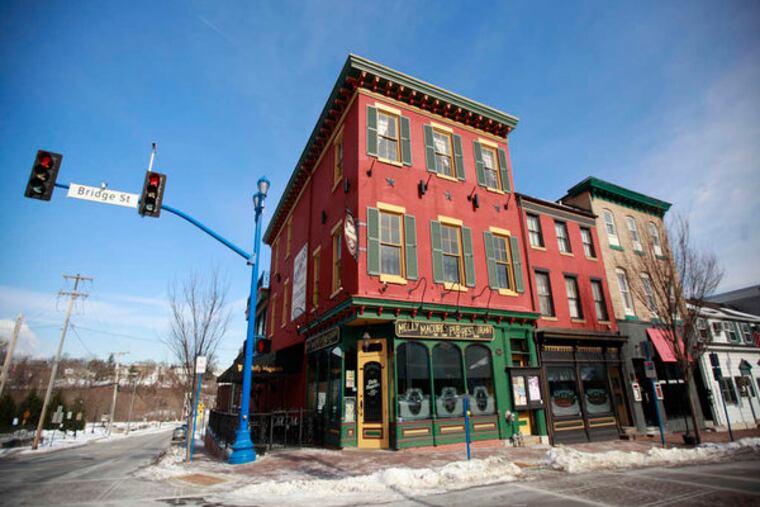Town By Town: Phoenixville: Cherishing past, celebrating rebirth
One in a continuing series spotlighting real estate markets in the region's communities. Of all the reemerging boroughs in the Philadelphia area, Phoenixville may be the coolest, and not just because the Colonial Theatre remains "healthfully air conditioned."

One in a continuing series spotlighting real estate markets in the region's communities.
Of all the reemerging boroughs in the Philadelphia area, Phoenixville may be the coolest, and not just because the Colonial Theatre remains "healthfully air conditioned."
Where else do thousands gather every December, snow or not, to celebrate the rise from the ashes of this former industrial powerhouse by burning a giant wooden phoenix?
And there's the 1903 theater itself, brought back from the brink through a multiyear effort by volunteers and the generosity of private donors, businesspeople, and grants.
If only The Blob - whose celluloid visit to Phoenixville in 1958 put the Colonial on the sci-fi/B-movie cult map and made Steve McQueen a star - could see the place today!
(It actually does every summer, during "Blobfest," set for July 11-13 this year.)
"There is a real community spirit, born out of its past, that is very much alive" in Phoenixville, says Robb Cadigan, a 20-year-plus resident and former QVC executive. His first novel, Phoenixville Rising (Rodgers Forge Press, 2013), has been described as a "beautifully written love letter to the American industrial town."
Phoenixville's renewal has manifested itself with a lively restaurant-and-pub scene, akin to Media's and Doylestown's. It also has had a positive effect on the residential real estate values of a place that, as its industrial base eroded into rust, had nowhere to go but up.
Joseph Scott McArdle, an agent with Berkshire Hathaway Home Services Fox & Roach, traces the real estate renaissance to the "Camp Out" of March 20, 2004, just shy of a decade ago. That's when scores of prospective buyers spent a rainy night waiting to buy one of the 152 townhouses being built on a piece of the former Phoenix Steel site by S & S Development Co., with whom McArdle was working.
The price of a two-bedroom, 21/2-bath unit with garage at French Creek Townhomes: $169,900, he says. Today, resales bring $200,000 to $220,000.
The median price of a house here is $202,000, 6.3 percent higher than 2012, based on sales of 286 homes in 2013, according to BHHS Fox & Roach's HomExpert Report.
Anything priced above $230,000 is out of the affordability range of those who are attracted to Phoenixville, McArdle says.
The buyers at French Creek "were kids from the Main Line who wanted to be close to their parents but couldn't afford to live there," he says.
They were young, too. McArdle recalls two of those camping out were about 25 or 26 and were engaged to be married.
Today's buyers also are young - it's a group that can be found in any number of the reemerging boroughs, says Scott Troxel, office manager at Weichert Realtors' Collegeville office.
With skyrocketing demand, "the issue has been inventory," says Troxel: There aren't enough houses on the market that buyers are interested in.
"Some of the houses for sale have just been sitting there, either because the seller needed a certain amount of money for it and it was overpriced, or it needed work and wasn't attracting buyers," he says.
French Creek Townhomes and a few projects by small builders aside, the lion's share of houses in Phoenixville are the traditional brick rows typical of blue-collar factory towns.
In 2013, Troxel says, rarely were there more than 100 houses for sale. His figures show that on Dec. 11, the number was down to 84, yet 30 properties sold in the previous 30 days.
"That leaves an absorption rate of 2.6 months, which is a seller's market," says Troxel, adding that the goal of real estate agents as the spring market approaches is to persuade more people to list their homes.
"Last-time buyers" also are attracted to Phoenixville, Troxel says, although not in such big numbers.
At Reeves Park Place, a Victorian mansion converted to 10 condos, a two-bed, two-bath unit just sold for under $100,000, he says.
When Upper Darby native Peter Fey and his family moved to Phoenixville 14 years ago, "it was an excellent value for our money, and we had heard good things about the [Phoenixville Area] schools."
"There wasn't much in the way of restaurants or nightlife then, but the area - Bridge Street in particular - has come a long way," Fey says, with Sips Bistro, Soltane, Bridge St. Chocolates, Vecchia Pizzeria, Molly Maguire's, and Hacienda La Michoacana complementing the Black Lab Bistro and Majolica.
In addition to Blobfest, he says, the Colonial offers a lineup of independent and classic films and live shows.
"Rooftops drive retail," McArdle says. "New residents, with their new disposable incomes, increase the demand for retail."
Cadigan, whose book's main character returns to Phoenixville 30 years after he chose to escape "a dead-end life," says that while "residents are justifiably proud of the past, we don't live in it."
"Phoenixville has in fact risen from the ashes of the defunct mill and a difficult period a few decades ago, the school system has developed into one of the best around, the restaurants are consistently top-rated," he adds.
Says Troxel: "Boroughs that are reemerging hold on to traditions that tie them to the past, and that in itself helps bring new life to these places."
215-854-2472 @alheavens